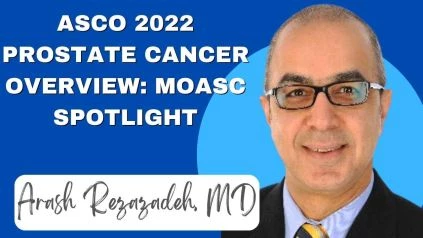ASCO 2022 Prostate Cancer Overview: MOASC Spotlight
Â
ARASENS Trial
I presented at MOASC three datasets in prostate cancer from the 2022 ASCO annual meeting. The first dataset was in metastatic castration-sensitive prostate cancer, the so-called ARASENS trial phase III study.
Â
And we presented the data with ADT plus docetaxel plus dose AEL plus minus Darolutamide. These patients continue to get the triplet or doublet until the metastatic disease progression (cancer) or has unacceptable toxicity (management).
Â
And then, we showed that there was an overall survival benefit in a subset of patients with de novo metastatic disease or patients who had recurrent disease (prostate cancer patients).
Â
 PEACE1 Trial
We discussed another data set, so-called PEACE1 castration resistant prostate cancer at the 2022 ASCO annual meeting, which used a similar approach with ADT plus docetaxel plus minus abiraterone and prednisone as their novel hormonal agent.
Â
And again, this showed overall survival, and the data in a high volume setting was rather impressive. In the end, we discussed the necessity of docetaxel to be added to ADT, plus novel hormone therapy in patients with hormone sensitive prostate cancer.
Â
Whether it’s necessary to have chemotherapy or not, we discuss the possibility of adding the possibility of performing another trial, maybe with ADT plus novel hormonal therapy (or targeted therapy) plus minus Docetaxel, to show the benefit of Docetaxel. And I mentioned it’s probably a very difficult trial to accrue, to give chemotherapy or not to patients and have it positively affect their overall survival.
Â
And getting the funding for that and getting the trial going with a drug, which is already generic, maybe through the cooperative groups possible, but generally, a difficult trial to do.Â
Â
The second data set that we talked about was EV-301, which used Enfortumab Vedotin in a neoadjuvant setting for patients who were not eligible for cisplatin-based chemotherapy in a neoadjuvant setting.
Â
And we showed the data with PT 0 and PT downstage, both, and efficacy on this drug is a small number in that trial, which generally showed benefit.
Â
We discussed issues with that small subset of that trial. So-called cohort H and the possibility of having a larger trial, which is ongoing and showing benefits in T3, and T4 higher stages of bladder cancer.
Â
And in the end, I showed a list of trials looking at the same patient population who were not eligible for cisplatin neoadjuvant chemotherapy, cisplatin-based neoadjuvant chemotherapy, and maybe benefiting from the checkpoint inhibitors plus minus ADC in a different setting. And there are multiple trials ongoing right now.
Â
And the last data set was using pembrolizumab in an adjuvant setting for patients with intermediate high or status post mastectomy with RCC, clear cell RCC (ccRCC). And we discussed the updated data set with 6 more months of additional follow-ups, which was consistent with the benefit of a disease-free survival rate.
Â
And at the end, we are waiting for another couple of trials to be presented soon, hopefully at ESMO. There was a press release that showed that announced that the IPI/NIVO, if you use Nivolumab versus placebo in a similar patient population, was done by BMS and that trial did not meet the end point of disease-free survival outcomes.
Â
There’s a similar trial with Atlizumab which was again the same patient population with high-risk disease or intermediate high-risk disease. And we’ll wait for those data to become available and, hopefully, put all these three trials to a big suggestion and treatment recommendation for our patients with prostate cancer tumors. But can you use them with parp inhibitors?Â
Â
Thank you very much for your attention.
 Â
So, the take home messages, I want to say. We all must continue to accrue through these trials to get answers to these unanswered questions for our patients. And continuing to support trials is a very important thing for all of us.
Â
Just want to mention that at the end of my talk about the trials from the 2022 ASCO annual meeting.
Â
Dr. Arash Rezazadeh’s ASCO [2022] Genitourinary Cancer: MOASC Spotlight Presentation –
https://oncologytube.com/video/41291
Â
Arash Rezazadeh, MD – About The Author, Credentials, and Affiliations
Dr. Arash Rezazadeh is an Associate Clinical Professor in clinical oncology at UCI Health and an medical oncologist who focuses their practice on the treatment of urologic malignancies.

